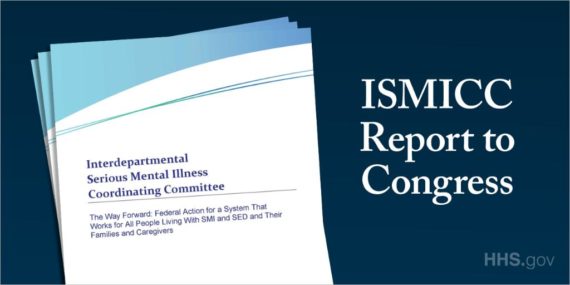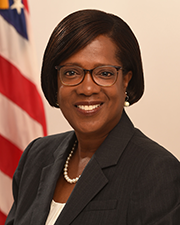
(3-10-22) A federal panel created by Congress to advise it and the Substance Abuse and Mental Health Services Administration (SAMHSA) about serious mental illnesses and serious emotional disturbances is being reinvigorated by Health and Human Services Assistant Secretary Miriam E. Delphin-Rittmon, PhD..
Before it was largely forgotten midway through the Trump Administration, the Interdepartmental Serious Mental Illness Coordinating Committee (ISMICC) was pushing for better cooperation between federal agencies that provide mental health services and was promoting new and best practices.
ISMICC is composed of 14 non-federal members who work with representatives from federal agencies that oversee mental health programs. It was created by the 21st Century Cures Act and signed into law during the final days of the Obama Administration. ISMICC’s 14 non-government members represent specific groups. For example, two members must be peers with lived experiences. I am the lone parent representative. Judge Steven Liefman from Miami-Dade, Florida, is one of two judges on the panel. (I’ve posted a list of all members at the end of this blog.)
Shortly after being confirmed, Assistant Secretary Delphin-Rittmon announced that she wanted the ISMICC advisory panel to become more involved in advising SAMHSA about programs that work and don’t. (President Trump issued an executive order shortly after taking office, ordering agencies to eliminate most advisory panels, charging that many were unnecessary or obsolete.) Assistant Secretary Delphin-Rittmon assigned SAMHSA officials, Dr. Anita Everett and Cynthia Kemp, to bring ISMICC back to life. Both have done a bang up job!
This month, ISMICC members will break into five informal work groups to discuss how the federal government can improve mental health programs. I am serving on the workgroup that is examining criminal justice reform.
Two SAMHSA staff facilitators will oversee each workgroup. All five workshops will report to the full ISMICC committee when it meets April 13 from 1 to 5 pm EST. The public is being encouraged to watch that meeting and participate by calling in during the public comment section.
The criminal justice workgroup will review and update the nine recommendations that advisory members made in 2017 when we issued our first report.

Asst. Sec. Miriam Delphin-Rittom
Those recommendations are designed to: minimize arrests, provide appropriate hotline services, better train first responders, reduce waits for forensic beds and competency hearings, create therapeutic courts and dockets, require mental health screening for everyone booked into a jail, limit or eliminate the use of solitary confinement, seclusion, and restraints for SMI and SED individuals, reduce barriers for SMI and SED prisoners when released so they can obtain federal disability payments and housing, and review federal programs for juvenile offenders. (All ISMICC recommendations can be found in this report.)
The decision by Dr. Delphin-Rittmon to reactivate ISMICC is a positive step forward and she was smart in assigning Dr. Everrett, who worked with ISMICC before it was buried, and Cynthia Kemp, who has a proven track record of running successful programs.
Hopefully, ISMICC will be able to do more than issue a report that, like so many in Washington, gets shelved and forgotten. With this new burst of energy, ISMICC should be able to participate in prioritizing and pushing actual policy reforms.
Let’s hope so.
Meet Cynthia Kemp:
List of ISMICC members.
ISMICC Federal Members
Federal Membership: The ISMICC will be composed of the following federal members or their designees:
- The Secretary
- The Assistant Secretary for Mental Health and Substance Use
- The Attorney General
- The Secretary of the Department of Veterans Affairs
- The Secretary of the Department of Defense
- The Secretary of the Department of Housing and Urban Development
- The Secretary of the Department of Education
- The Secretary of the Department of Labor
- The Administrator of the Centers for Medicare and Medicaid Services
- The Commissioner of the Social Security Administration
ISMICC Non-Federal Members
The ISMICC’s non-federal membership represents mental health researchers, providers, patients, families, judges, law enforcement officers, and other professionals who work with people living with SMI. The following national experts were selected in August 2017 to serve three-year terms:
- Trinidad de Jesus Arguello, Ph.D., LCSW, PMHRN-BC, Director, Compostela Community and Family Cultural Institute
- Yasmine Brown, M.S., Chief Executive Officer, Hope Restored Suicide Prevention Project, LLC
- Ron Bruno, Founding Board Member and Second Vice President, CIT International
- David Covington, LPC, MBA, CEO/President, RI International
- Pete Earley, Author
- Brian Hepburn, M.D., Executive Director, National Association of State Mental Health Program Directors
- Jennifer Higgins, Ph.D., CCRP, Owner, CommonWealth GrantWorks
- Johanna Kandel, B.A., Founder and Chief Executive Officer, The Alliance for Eating Disorders Awareness
- Steven Leifman, J.D., Associate Administrative Judge, Miami-Dade County Court, Eleventh Judicial Circuit of Florida
- Adrienne Lightfoot, Peer Program Coordinator, DC Department of Behavioral Health
- Amanda Lipp, B.S., Director and Filmmaker, Lipp Studios
- Winola Sprague, DNP, CNS-BC, Medical Director, Children’s Advantage
- Rhathelia Stroud, J.D., Presiding Judge, DeKalb County Magistrate Court
- Katherine Warburton, D.O., Medical Director and Deputy Director of Clinical Operations, California Department of State Hospitals



